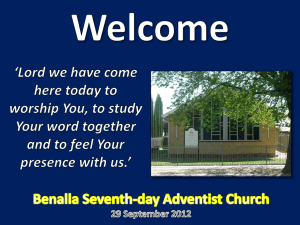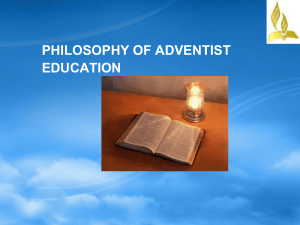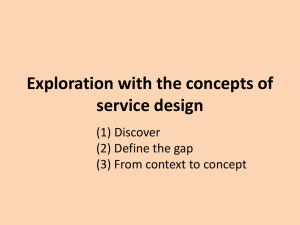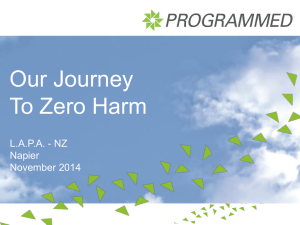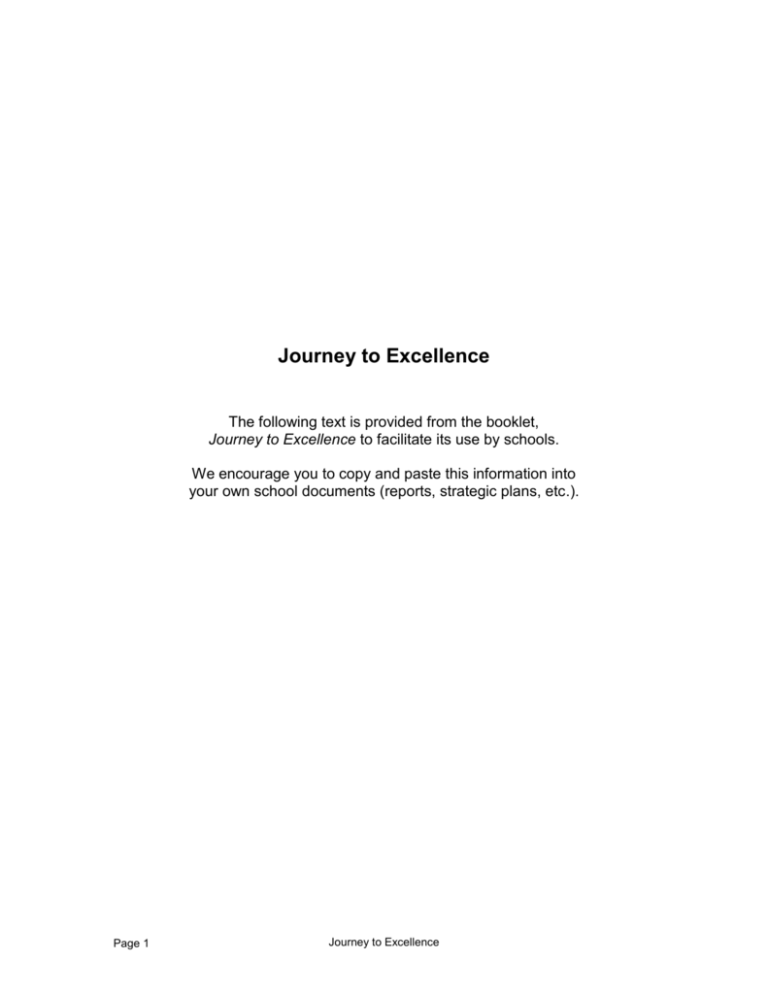
Journey to Excellence
The following text is provided from the booklet,
Journey to Excellence to facilitate its use by schools.
We encourage you to copy and paste this information into
your own school documents (reports, strategic plans, etc.).
Page 1
Journey to Excellence
Foreword
In the mid-1990s, a North American Division Curriculum Futures Commission
was established to create a renewed vision for curriculum in Seventh-day
Adventist schools in the 21st century. That group focused on the 9–12
secondary program. Its report, titled Focus on Adventist Curriculum for the 21st
Century and often referred to as the FACT-21 report, was approved by the North
American Division Board of Education in 1997. Secondary schools across the
Division began to develop initiatives for change based on this report.
Educational leadership at all levels in the North American Division has
determined that the content of this report is vital to the school improvement
process in Adventist schools. Thus, the features of this program are being
integrated into a variety of Adventist educational publications and resources such
as curriculum guides and evaluation instruments.
Recognizing that the material in the FACT-21 report had value for Adventist
education K–12, the North American Division appointed a committee to revise
and update the report, developing a document that would be fully K–12 in scope
and current in content. This work was subsequently approved for publication in
2002. The primary components of the FACT-21 report — Philosophy, Goals,
Essential Core Elements, and Preferred Practices — have been revised,
expanded and integrated into this model for school improvement: Journey to
Excellence.
Acknowledgments:
The Journey to Excellence Model
Journey to Excellence is based on a model of school improvement developed by
Paul Brantley. Please see: Brantley, Paul. "Can Education Be Adventist and
Excellent, Too?" Journal of Adventist Education, Summer 1999.
NAD Curriculum Futures Commission (1997)
Jim Epperson & Dick Osborn — Co-chairs, Kelly Bock, Paul Brantley, George
Bronson, Irma Hadley, Keith Hallam, Alan Hurlbert, Steve Pawluk, Gary Temple,
Rosemary Tyrrell, Berit von Pohle, Doug Walker, Don Weatherall, Cleon White
NAD K–12 Revision Committee (2002)
Dennis Plubell – Chair, Kelly Bock, Alan Bohman, Debra Fryson, LouAnn
Howard, Erma Lee, Berit von Pohle, Don Weatherall, John Wheaton.
Page 2
Journey to Excellence
Journey To Excellence
In the 21st century Adventist education must build on the strengths of the past to
create a dynamic future. With renewed purpose, effective plans for
improvement, and innovative practices, schools and students will thrive in this
new century.
Journey to Excellence is about change — innovative change that will result in
school improvement. This publication should empower educational leaders to
embark on a journey to excellence. It should be a catalyst to create the future
now in Adventist schools.
Journey to Excellence will fulfill the vision of vibrant Adventist education in the
21st century. However, excellent schools are not produced by accident or as the
result of a single change event. Excellence is an organizational culture that
encourages continual, planned improvement. When all aspects of the
educational environment foster ongoing innovation, quality schools will emerge.
Journey to Excellence includes:
vision, shared values, and common goals.
clear understanding of the philosophy, history, and goals of Adventist
education.
utilization of the growing body of research on effective education.
educational leaders and governing boards who create school cultures that
encourage innovation without fear of failure.
renewing cycle of improvement in Adventist schools.
Journey to Excellence is illustrated in this model:
QuickTime™ and a
Photo - JPEG decompressor
are needed to see this picture.
QuickTime™ and a
Photo - JPEG decompressor
are needed to see this picture.
Page 3
Journey to Excellence
Purpose
[Reasons]
Exemplary schools and educational systems have clearly defined reasons for
existence. Those specific to Adventist education are found in the Philosophy,
Goals, and Essential Core Elements that identify the high expectations of what
students should know and be able to do. A renewed focus on these ideals for
Adventist schools will energize educators, students, parents, and constituents.
Philosophy
The Seventh-day Adventist Church recognizes God as the ultimate source of
existence and truth. In the beginning God created in His image a perfect
humanity, a perfection later marred by sin. Through the guidance of the Holy
Spirit, God’s character and purposes can be understood as revealed in nature,
the Bible, and Jesus Christ. The distinctive characteristics of Adventist
education, derived from the Bible and the inspired writings of Ellen G. White,
point to the redemptive aim of true education: to restore human beings into the
image of their Maker.
While God presents His infinitely loving and wise character as the ultimate norm
for human conduct, human motives, thinking, and behavior have fallen short of
God’s ideal. Education in its broadest sense is a means of returning human
beings to their original relationship with God. Its time dimensions span eternity.
Adventist education seeks to develop a life of faith in God and respect for the
dignity of all human beings; to build character akin to that of the Creator; to
nurture thinkers rather than mere reflectors of others’ thoughts; to promote loving
service rather than selfish ambition; to ensure maximum development of each
individual’s potential; and to embrace all that is true, good, and beautiful.
An education of this kind imparts far more than academic knowledge. It fosters a
balanced development of the whole person — physically, intellectually, socially,
and spiritually. Working together, homes, schools, and churches cooperate with
divine agencies in preparing learners for responsible citizenship in this world and
in the world to come.
Page 4
Journey to Excellence
GOALS for Curriculum in Seventh-day Adventist Schools
Each student will:
1. Acceptance of God
Surrender one’s whole life to God; develop a
relationship with Jesus Christ; and allow the Holy
Spirit to work in one’s life.
2. Commitment to the Church
Desire to know, live and share the message and
mission of the Seventh-day Adventist Church.
3. Interpersonal Relationships
Develop a sense of self-worth, skills in
interpersonal relationships, an understanding of
the responsibilities of family membership and the
ability to respond with sensitivity to the needs of
others.
4. Responsible Citizenship
Develop an understanding of cultural and
historical heritages, affirm a belief in the dignity
and worth of others and accept responsibility for
local, national and global environments.
5. Healthy Balanced Living
Accept personal responsibility for achieving and
maintaining optimum physical, mental and
spiritual health.
6. Intellectual Development
Adopt a systematic, logical and biblically-based
approach to decision-making and problemsolving when applied to a developing body of
knowledge.
7. Communication Skills
Recognize the importance of effective
communication and develop the requisite skills.
8. Personal Management
Function responsibly in the everyday world using
Christian principles of stewardship, economy and
personal management.
9. Aesthetic Appreciation
Develop an appreciation of the beautiful, both in
God’s creation and in human expression, while
nurturing individual ability in the fine arts.
10. Career and Service
Develop a Christian work ethic with an
appreciation for the dignity of service.
Page 5
Journey to Excellence
GOALS AND ESSENTIAL CORE ELEMENTS
for Curriculum in Seventh-day Adventist Schools
GOALS:
ESSENTIAL CORE ELEMENTS:
The following goals have been established to
support the unique philosophy of Adventist
education. Each student will:
Essential core elements clarify and expand the
goal statements and are intentionally infused
into a curriculum that teaches students to:
1. ACCEPTANCE OF GOD
Surrender one’s whole life to God; develop a
relationship with Jesus Christ; and allow the
Holy Spirit to work in one’s life.
A. Accept God as the Creator and the
Redeemer.
B. Have a growing knowledge of God’s Word
and enjoyment in its study.
C. Embrace God’s gift of grace by accepting
Christ as one’s personal Savior.
D. Discover the importance and power of
prayer and faith in one’s relationship with
Jesus.
E. Value God’s revelation of Himself through
inspired writings and creation.
F. Respond to God’s love by using one’s
spiritual gifts to serve others.
G. Recognize that God gave the Ten
Commandments to show us how to love Him
and each other.
H. Value and participate in worship alone and
with others.
2. COMMITMENT TO THE CHURCH
Desire to know, live and share the message
and mission of the Seventh-day Adventist
Church.
A. Be an active participant in one’s local
church.
B. Understand how the organization of the
Seventh-day Adventist Church facilitates its
mission.
C. Become involved in spreading the gospel
throughout the world.
D. Accept the fundamental beliefs of the
Seventh-day Adventist Church.
E. Appreciate the heritage of the Seventh-day
Adventist Church.
F. Relate to lifestyle choices and cultural
issues based on biblical principles.
Page 6
Journey to Excellence
GOALS:
ESSENTIAL CORE ELEMENTS:
The following goals have been established to
support the unique philosophy of Adventist
education. Each student will:
Essential core elements clarify and expand the
goal statements and are intentionally infused
into a curriculum that teaches students to:
3. INTERPERSONAL RELATIONSHIPS
Develop a sense of self-worth, skills in interpersonal relationships, an understanding of the
responsibilities of family membership and the
ability to respond with sensitivity to the needs
of others.
A. Recognize that God’s ideal for the basic unit
of society is the family.
B. Develop an appreciation for the diversity of
individuals.
C. Acquire knowledge, attitudes and skills
essential to meeting family responsibilities,
whether living alone or with others.
D. Recognize that God’s unconditional love
gives one self-worth.
E. Value sexuality in the context of God’s ideal.
4. RESPONSIBLE CITIZENSHIP
Develop an understanding of cultural and
historical heritages, affirm a belief in the dignity
and worth of others and accept responsibility
for local, national and global environments.
A. Exhibit concern and sensitivity for other
peoples and cultures.
B. Participate actively in local, national and
global communities.
C. Understand the functions of governments
and their impact on individuals and society.
D. Use a biblical perspective to analyze history
and current events.
E. Assume an active role in nurturing and
preserving God’s creation.
Page 7
Journey to Excellence
GOALS:
ESSENTIAL CORE ELEMENTS:
The following goals have been established to
support the unique philosophy of Adventist
education. Each student will:
Essential core elements clarify and expand the
goal statements and are intentionally infused
into a curriculum that teaches students to:
5. HEALTHY BALANCED LIVING
Accept personal responsibility for achieving
and maintaining optimum physical, mental and
spiritual health.
A. Recognize that God’s ideal for quality living
includes a healthy lifestyle.
B. Incorporate into one’s lifestyle the principles
that promote health: nutrition, exercise,
water, sunlight, temperance, air, rest, trust in
God.
C. Avoid at-risk behaviors.
D. Apply Christian principles in recreation and
sports.
E. Achieve a balance in work and leisure;
balancing physical, mental, social and
spiritual activities.
F. Recognize the interaction of physical,
mental and spiritual health with emotional
and social well-being.
6. INTELLECTUAL DEVELOPMENT
Adopt a systematic, logical and biblically-based
approach to decision-making and problemsolving when applied to a developing body of
knowledge.
A. Broaden intellectual abilities through the
study of God’s Word.
B. Use critical and creative thinking skills in
“real-world” experiences.
C. Develop one’s intellectual potential in natural
sciences and mathematics; arts and
humanities; social sciences and applied arts.
D. Utilize effective study techniques to locate,
organize and learn information.
E. Apply the principles of life-long learning.
F. Approach all intellectual pursuits from a
biblical perspective.
Page 8
Journey to Excellence
GOALS:
ESSENTIAL CORE ELEMENTS:
The following goals have been established to
support the unique philosophy of Adventist
education. Each student will:
Essential core elements clarify and expand the
goal statements and are intentionally infused
into a curriculum that teaches students to:
7. COMMUNICATION SKILLS
Recognize the value and importance of
effective communication and develop the
requisite skills.
A. Communicate effectively through the
avenues of reading, writing, listening,
speaking and non-verbal language.
B. Apply a Christ-centered perspective to all
forms of personal expression and media.
C. Understand how sensitivity to the
differences of others affects communication.
D. Recognize how media and information
technology impact communication.
E. Utilize communication skills to enhance
one’s Christian witness.
8. PERSONAL MANAGEMENT
Function responsibly in the everyday world
using Christian principles of stewardship,
economy and personal management.
A. Develop responsible decision-making skills.
B. Appropriately manage one’s personal
finances.
C. Acquire skill in the use of technologies.
D. Develop basic home-management skills.
E. Value cooperation and teamwork when
interacting in groups.
F. Develop conflict resolution skills.
G. Manage time effectively.
Page 9
Journey to Excellence
GOALS:
ESSENTIAL CORE ELEMENTS:
The following goals have been established to
support the unique philosophy of Adventist
education. Each student will:
Essential core elements clarify and expand the
goal statements and are intentionally infused
into a curriculum that teaches students to:
9. AESTHETIC APPRECIATION
Develop an appreciation of the beautiful, both
in God’s creation and in human expression,
while nurturing individual ability in the fine arts.
A. View God as the Author of beauty, both in
His creation and in human expression.
B. Employ biblical principles as the basis for
appreciation and expression of creative and
performing arts.
C. Develop fine arts talents through practice,
performance and presentation.
D. Use aesthetic expression as a means of
communication and service.
10. CAREER AND SERVICE
Develop a Christian work ethic with an
appreciation for the dignity of service.
A. Develop an awareness of career options
and opportunities in a changing world, as
well as in the church.
B. Recognize the role of useful work in
personal development and maintaining selfworth.
C. Develop skills that will enhance
employability.
D. Experience the joy of serving others.
E. Identify one’s interests, abilities and values,
understanding their relationship to career
options.
F. Always put forth one’s best effort in every
task.
Page 10
Journey to Excellence
PLAN [Resources]
An effective journey to excellence requires careful planning. Resources must be
allocated at all organizational levels in new and creative ways to support school
improvement initiatives. Based on educational trends and research, innovative
changes are vital in the utilization of resources such as information technology
and time.
With a focus on the philosophy and goals of Adventist education, leaders at all
levels will create ongoing professional development opportunities for all
personnel. A sustained journey to excellence is enhanced by creative
partnerships. Administrators and governing boards must recognize that
innovative practices will require additional time and funding.
The following Preferred Practices will support an effective ongoing school
improvement process:
Educational Technology
Partnerships
Staff Development
Time Utilization
Educational Technology
A. All schools, conferences, unions, and the Division will develop a master plan
addressing the needs of educational technology in such areas as:
staff development
curriculum
hardware
software
multimedia
internet access
distance education
witness/service potential
acceptable use policies
assistance and support
B. Schools will budget funds to provide and maintain current and emerging
technologies
C. Schools will provide students regular access to technology tools and online
resources throughout the campus
D. Educators will incorporate technology throughout the instructional program
E. Schools may utilize distance learning to:
link schools together for relevant communication.
provide curriculum offerings otherwise unavailable.
access professional development opportunities.
Page 11
Journey to Excellence
Partnerships
School leaders will forge communication links to:
develop a strong three-way partnership between the home, school, and
churches which promotes and supports Christian education.
involve parents, constituents, and the community in school improvement
initiatives.
foster partnerships with local community organizations which will encourage
opportunities such as community-based learning and projects, work
experience, financial grants, internships, and career awareness.
cooperate with home-schooling parents and their children, neighboring
schools, and other educational entities.
Professional Development
Professional development is an essential, on-going process that creates a
collaborative school environment fostering student achievement.
A. Effective professional development will focus on areas of identified need,
innovative methods, and research-driven topics.
B. Effective professional development includes clear and specific goals
established by:
the teacher creating and implementing a personal professional
development plan.
the school as outlined in the comprehensive school improvement plan.
the conference, union, and Division through improvement initiatives.
C. Effective professional development will include on-going systematic activities
such as:
attending seminars, workshops, and professional conventions
membership and participation in professional organizations
maintaining appropriate teaching certification
mentoring
peer coaching
participating in study groups
observing other teachers and other school programs
professional presentations
professional reading
studying for advanced degrees
D. To promote exemplary schools, teachers, schools, conferences, and unions
will ensure adequate time is available on an on-going basis for planning,
implementation, and participation in specific professional development
activities.
Page 12
Journey to Excellence
Page 13
Journey to Excellence
Time Utilization
A. Administrators will create a school calendar that includes time throughout the
year for on-going professional growth and planning activities.
B. Teachers will be given release time for planning and pursuing professional
development activities.
C. Educators may create programs allowing students to progress toward
graduation by demonstrating competency/mastery instead of fulfilling seat
time.
D. Administrators, teachers, and students will work to effectively balance the
time demands of a strong co-curricular program with the academic program.
E. Schools will creatively allocate instructional time to effectively meet the needs
of students through the use of strategies such as:
team teaching
integrated curriculum
block scheduling
length of school day/year
PRACTICE [Realities]
A journey to excellence requires trained leaders who can assess existing
educational practices and collaborate with others to develop and implement
innovative plans in a recurring cycle of excellence. Effective schools are safe
and nurturing environments where curriculum is delivered in a relevant and
responsible manner. These schools will continue to improve assessment and
evaluation procedures utilizing research-based methods.
The following Preferred Practices will generate new realities:
Administrative Leadership and Development
Classroom Instruction
Climate
Diversity
Integrated Curriculum
Student Assessment
Administrative Leadership and Development
A. Administrators will recognize the importance of the leadership role. The
exemplary administrator will effectively relate with groups and individuals
while maintaining a clear vision for the school program by:
Page 14
Journey to Excellence
fostering a spiritual climate.
creating a culture for learning.
researching and implementing effective instructional strategies.
developing a personal professional growth plan which includes activities
such as:
a. membership in professional organizations.
b. attendance at relevant workshops.
c. professional reading.
assisting staff in professional development.
supporting staff in innovative practices.
maintaining appropriate certification.
promoting the school to its various constituencies.
managing the variety of school functions.
B. Administrators will enhance their professional performance through practices
such as reviewing current literature, seeking regular evaluations, keeping time
logs, and conducting constituent surveys to assist in self-evaluation
C. Administrators will identify potential candidates for administrative positions
and provide opportunities for leadership development. The fostering of new
leaders may include the use of resources for:
internships
mentoring
release time
professional development
Classroom Instruction
A. Educators will utilize instructional designs that create a school environment
that promotes student achievement and engenders enthusiasm for life-long
learning.
B. In order to effectively deliver instruction in the classroom teachers will:
be knowledgeable about the theories of learning styles and will continue to
be aware of the needs of learners through current research and
professional growth activities.
help students identify their dominant learning styles and provide
opportunities to strengthen less-developed learning styles.
employ a variety of instructional strategies to meet the learning styles of
individual students.
C. Teachers will develop a community of learners by effectively balancing major
instructional strategies which include:
Page 15
experiential learning
a. faith-sharing activites
b. service projects
c. community-based activities
d. field trips
Journey to Excellence
e. outdoor education/expeditionary schools
direct instruction
a. interesting and engaging lectures of an age-appropriate length
b. individualized instruction
problem-based learning
a. critical thinking instruction
b. case studies
c. extended projects
d. laboratory experiences
social learning
a. cooperative learning methods
b. leadership activities
c. role playing
d. affective education (i.e., social skills training, conflict resolution, anger
management, character training)
e. partnerships
remediation and enrichment activities
a. on-going assessment of individual needs
b. student mentoring/tutoring
c. activities and resources for exceptional students
Climate
A school’s community will provide a nurturing and safe environment which:
encourages recognition and respect for the value and worth of each
individual.
provides a variety of positive examples and experiences.
enables individuals to attain the highest level of achievement.
encourages individuals to accept personal responsibility for their behavior and
choices.
Diversity
A. Adventist schools will recognize that individuals come from diverse
backgrounds such as:
Page 16
race
culture
gender
physical ability
family structure
age or generation
value system and beliefs
personal learning styles
socioeconomic group
Journey to Excellence
religion
B. Adventist schools will demonstrate a respect for diversity and teach that
acceptance leads to unity through the love of Jesus.
C. Schools will promote an environment that appropriately celebrates the
diversity found among God’s children.
D. Schools will employ instructional methods which are sensitive to diversity.
Integrated Curriculum
Teachers will offer a cohesive curriculum enabling students to see connections
between the many fields of learning by:
integrating faith throughout the curriculum.
building connections within a discipline/subject area and to other related
areas including co-curricular activities.
cooperating with other teachers in integrating curriculum between
disciplines/subject areas and grade levels.
Student Assessment
A. Teachers and school systems will measure student progress and
development in a variety of meaningful ways such as:
traditional written assessments
a. true/false
b. multiple choice
c. essay/short answer
standardized tests
a. criterion referenced
b. norm referenced
performance-based assessments
a. demonstrations and performances
b. peer assessments
c. portfolios
d. products
e. rubrics
f. self-assessments
g. simulations
h. student-led conferences
Page 17
Journey to Excellence
B. Educators will use assessment as the basis for:
enrichment and remediation
individualized instruction
curricular instructional modifications
reporting student progress and mastery of objectives
teacher self-evaluation
PRODUCT [Results]
A benchmark of an exemplary Adventist school is the regular evaluation of all
aspects of its educational program. The school must examine its total effect on
each student to determine if a quality product has been produced and if desired
results have been achieved. This assessment may be informal or formal,
resulting in data that measures goal attainment. Excellence is not a single
accomplishment or a one-time event; it is a continuous cycle that pervades the
classroom, the school, and the entire system.
Evaluate [Improve]
Journey to Excellence for Adventist schools is founded on a unique philosophy
and purpose, requires carefully developed plans for improvement, adopts
innovative changes in educational practice, and regularly assesses the
attainment of goals and essential elements of the Adventist curriculum. At every
step educators must evaluate progress and product to make improvements for
the ultimate benefit of students.
Exemplary Adventist schools and educators will be noted for continuous
improvement throughout all areas of the program. Schools will develop and
implement school improvement plans aligned with excellence. Educators will
maintain certification and participate in professional training to prepare for a
journey to excellence. Regular evaluation will provide feedback for improving the
journey and will communicate the importance of excellence in Adventist schools.
Enjoy the Journey!
North American Division Office of Education
12501 Old Columbia Pike | Silver Spring, MD 20904
All contents © 2003. All rights reserved. Unauthorized duplication prohibited.
http://www.journeytoexcellence.org
Page 18
Journey to Excellence

